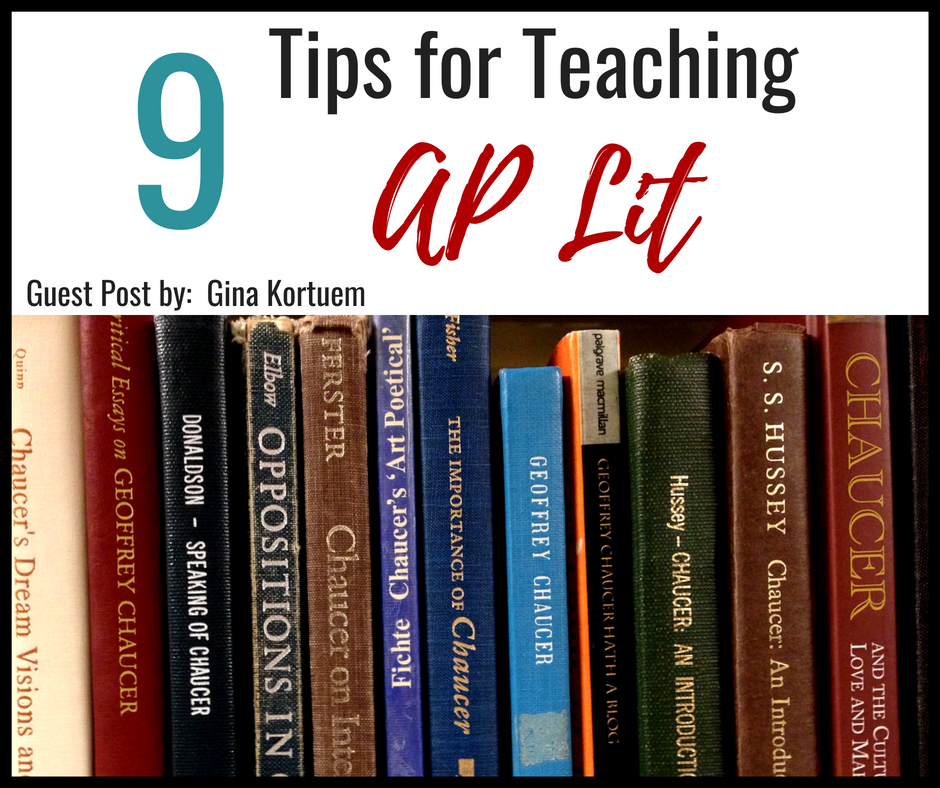Guest Post By: Gina Kortuem
In the summer of 2006 I had my first teaching interview while sitting in my parents’ living room. It was a phone interview, since the job was out of state. The conversation went well with the principal seeming happy about my responses to issues of classroom management and my love for the content area. As the conversation closed, he casually said, “Oh and you would be teaching AP Lit. That won’t be a problem will it?” Because I was so happy the interview was ending, I quickly said, “Oh not at all! I took that class as a senior, so that won’t be a problem.”
You may think that I regret this decision to teach AP Lit when I was only 22 fresh out of college and green as grass, but I don’t at all. Was I a great first-year AP teacher? No, not really. Was I under-prepared? OH, YES. But each summer I read more books, studied up on different strategies, and, year after year, I got better.
Teaching an AP course is incredibly difficult because it comes with the added pressure from students’ desires for college credit, parents wanting their money’s worth from the exam prices, and the administration looking over your shoulder. As if a year’s set of scores alone can measure a teacher’s ability (but that is a whole other blog post). I’ve now been teaching AP Lit for twelve years, and I’ve been an AP Reader for five. While I still don’t consider myself an expert, it is safe to say that I am seasoned. So for any new or “newish” AP Lit teachers looking for advice, here are my top tips:
Teach books that you love.
When I was hired at my first job, I spent a month and a half sitting on the floor of my nearly empty apartment simply reading over the material. My booklist was not incredibly extensive, but most of the books were new to me, so I had some studying to do. One of the books I was supposed to teach was A Prayer for Owen Meany by John Irving. It wasn’t a bad book by literary standards, but I just hated it. Rather than trudge through a novel I detested, I looked through our school’s book room and found old class copies of Frankenstein discarded by the previous teacher (who, coincidentally, dropped it because she hated it). I simply swapped out titles and voila! I was able to teach a book that I love. When you love the text, you put more effort into teaching it well. You read it closely. You re-read it along with the students. You know the characters inside and out. And all of this shows. Conversely, if you are teaching a book that you think is boring, why would a student ever want to read it?
Always pre-read an entire book before teaching it.
I heard once of a teacher who, on the first day of teaching Robert Penn Warren’s All the King’s Men, announced that she hadn’t read the book yet, so they would just explore it together. Immediately, the students knew that they wouldn’t have to read the book very closely (or possibly at all), and they assumed it must not be a good book if the teacher hadn’t even bothered to read it before teaching it. Now this may seem like a no-brainer, but some of us get into tricky situations where we need to teach a novel or play with little time to prepare. Even when I get overworked, I remind myself that being an AP student is grueling, and many of my students have six hours or more of homework (each day!). I can’t in good conscience assign readings of a book until I have completed them myself.
Do not over-assign homework simply because a course is labeled AP.
I made this mistake early on in my teaching career. Rather than seeing an outpouring of masterful work, I saw scrapped-together drafts, half-hearted essays, and missed readings. I make it a rule to never assign more than 40 pages of reading in one night, and I try to keep it to 30 or less. Students can work hard in class and in small chunks of homework; remember, more is not always more.
Assign frequent writing assignments of shorter lengths.
I’ve seen AP syllabi that assign bi-weekly essays of 6 pages or more. Oh my goodness! I’m tired already! Who has time to grade that many essays? Instead, I assign writing assignments of shorter lengths more frequently. Students write reflections of 300 words every other day, complete on-demand essays about every other week, and only do a long essay each quarter. This method cuts down the workload (for both students and me!) but maintains rigor, and students are still consistently writing literary analysis.
Timed writings are the best tool for AP essay preparation.
Timed writings are 40-minute essays, conducted in class, on an unknown topic. Sometimes, my students will know they are writing a timed writing on, say, King Lear, but they don’t know the prompt until they walk in the room. They get 40 minutes because this is the time limit on the actual AP exam. I then score the essays using the rubrics from the AP exam, designed by College Board. While students are ”disinclined” to enjoy this activity, year after year they tell me it is by far the most helpful thing we do to prepare for the exam. No one likes timed writings in the moment, but it is inarguable that writing on-demand helps students prepare for the actual AP exam. One of my resources provides several tips for students writing for the AP Exam, from the point of view of an AP Reader. You can find this resource here.
AP teachers who are rigid and too set in their ways often have lower test scores.
Usually, this because the students have been pushed so hard that by the end of the year their brains are mush. Or, they’ve built up enough resentment for their drill instructor-teacher that they don’t want to give them the satisfaction of a good AP score (believe me, I’ve read these kinds of essays at the AP Reading). Every year, I adjust reading schedules and summative assessments based on my student make-up in my AP class. Furthermore, when stressful times arise, such as spirit week or tech week for our musical, I gauge my students’ exhaustion levels and often postpone or even excuse assignments when needed. Does this make me a pushover? No. It makes me empathetic. I also am willing to grant extensions to individual students struggling with a crippling workload or physical or mental health issues. This isn’t a sign of a good teacher; this is a sign of a good human. Be a good human; be merciful and give your kids a break when they need it.
Teach poetry on a consistent weekly basis.
If the AP Lit course has an Achilles’ heel, it would be poetry. Frankly, most kids hate poetry. Lots of English teachers hate it, too. And so often, it is done too quickly, or too simply. Usually students feel the most unprepared for poetry when the test rolls around (which is unfortunate since it comprises 50% of the test material!). A few years ago, I made a major change in my AP teaching when it came to poetry. Before this, I had done two units of poetry, one in the fall and one in the spring. Seeing a growing need for more poetry analysis, I implemented a weekly poem study throughout the entire year, in addition to our stand-alone units. Since I made this change, my students’ poetry analysis skills have grown much stronger, and they are able to write about it with much more fluency.
Good AP teachers don’t just teach literary analysis; they teach strategies for finding it.
I feel like I’ve been tooting my own horn so far, so let’s discuss an area that I need to work on. If I had an Achilles’ heel, it would be the prose question. It was my least favorite of the three essays, and it was the only prompt I had never scored at the AP Reading…until this year. As I read countless essays on Zenobia and her beguiling ways, I marveled at the top writers, thinking, “My kids are smart, but they could never have gotten that.” I wondered, how were these students able to make these observations on a text they had never read before? If you follow me on Instagram, you may have noted my minor obsession with Thomas C. Foster’s How to Read Literature Like a Professor, which has completely changed the way I approach teaching literature. I realized that I was making my students dependent on me to make the literary observations. They found symbols because I pointed them out. They saw recurring themes because I labeled them at the beginning of the novel. Foils and Christ figures were identified…by me. This book has taught me that I need to spend more time teaching students how to find literary analysis, rather than finding it for them. This coming school year we will be reading Foster’s book and implementing his strategies in each novel, play, and poem that we study afterwards in an effort to make my students more autonomous.
Remember, you are capable of doing this well if you’re willing to do the work.
Many educators are unaware that AP English Literature is a unique course, very different from all of the rest of the AP courses. Each course is designed with a specific set of guidelines and usually a suggested reading list. When it comes to AP Lit, we get almost no guidance. I guess they say that you need to teach Shakespeare, but that’s about it. There is no reading list for AP Lit, and that can be scary. If you were to look at all of the titles suggested on the open essay since its inception in the 70s, the titles would number almost a thousand, if not exceed it. Only Harold Bloom could read every book on that list. For many AP Lit teachers, especially those like me at 22 and facing their first teaching assignment, this can make you feel very small and unprepared. There are resources out there for you (Hello! I’m one of them!). Seek out a mentor teacher, either in your school or find one online. Follow AP Lit teachers on Instagram and Twitter (Hello again!). Find blogs. Search Pinterest. And read, read, read. When all else fails, go back to my first piece advice, which is to teach what you love. If you love it, you’ll teach it well, and your students will grow because of you.
About the Author
Gina Kortuem has taught AP Lit for twelve years, among other ELA classes, including electives such as Shakespearean Literature, Creative Writing, and History of Drama. She received her Bachelor’s degree in Secondary Education, English from Concordia University Chicago and her Master’s degree in Education from Bethel University. She also maintains the store AP Lit and More on Teachers Pay Teachers, where she sells teaching materials such as notes, tests, and lessons. She keeps busy with her three children and her husband in St. Paul, Minnesota. When she is not working, writing, or keeping small humans alive, she is usually reading.








